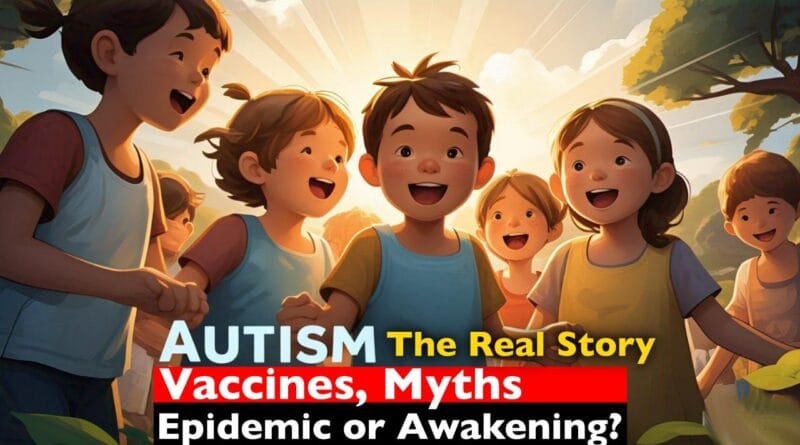Vaccines, Autism, and Truth: What Parents Must Understand in 2025
🧩 Autism: Epidemic or Awareness? Unpacking Truth, Fear, and Hope 💖
Imagine watching your child navigate the world, their laughter echoing, their little legs learning to run, their unique light beginning to shine. ✨ But then, a whisper of concern creeps in. Something feels… different.
Today, we’re stepping into a vital conversation that has recently resurfaced, sparking both curiosity and apprehension: Autism. Is it truly an autism epidemic, as some suggest? Or is it a surge in autism awareness? Let’s delve into the facts, dismantle the myths, and embrace the hope that lies within understanding.
📢 The Spark: RFK Jr.’s Claims and the Vaccine Debate 💉
Recently, Robert F. Kennedy Jr., a prominent figure and 2024 presidential candidate, ignited a firestorm by claiming an “autism epidemic” and linking it to vaccines. This isn’t the first time such claims have surfaced, casting a shadow of doubt and fear over crucial public health measures.
But the crucial questions remain: Is there actually an autism epidemic sweeping across the globe? And are vaccines and autism truly connected? Or is there a more profound narrative unfolding?
📊 The Numbers Speak: Understanding the Rise in Autism Diagnoses 🤔
Let’s look at the data. According to the Centers for Disease Control and Prevention (CDC), approximately 1 in 36 children are diagnosed with autism today. This figure marks a significant increase compared to the 1990s, when the prevalence was around 1 in 150.
However – and this is a critical point – experts overwhelmingly emphasize that this apparent “spike” is largely attributed to:
- Increased Autism Awareness: We are simply better at recognizing the signs of autism spectrum disorder (ASD) than ever before. 🧠
- Broader Autism Diagnostic Criteria: The criteria for diagnosing autism have expanded, encompassing a wider range of presentations. 🔍
- Early Autism Screening Initiatives: More proactive efforts are in place to identify autism in younger children. 👶
This doesn’t point to a sudden autism epidemic caused by external factors, but rather a greater understanding and identification of a neurodevelopmental difference that has always existed.
🔬 The Science is Clear: Vaccines and Autism – Separating Fact from Fiction 🛡️
The scientific consensus on the link between vaccines and autism is resounding and unequivocal. Numerous large-scale studies conducted by leading researchers and institutions worldwide, including Harvard University and the World Health Organization (WHO), have found no credible evidence supporting this connection.
In fact, over 26 extensive studies have consistently confirmed:
- ✅ Vaccines are safe.
- ✅ Vaccines save lives.
- ✅ Autism is NOT caused by vaccines.
Spreading misinformation about vaccines causing autism not only undermines public health but also distracts from the real challenges and needs of the autism community.
❤️ Beyond the Numbers: Autism as a Different Way of Experiencing the World 🌈
It’s crucial to shift the narrative around autism. Instead of viewing it as a tragedy or an “epidemic,” we need to recognize it for what it is: a different way of experiencing the world.
Children and adults with autism possess extraordinary talents, unique perspectives, and a profound beauty that often goes unnoticed in a neurotypical-centric society.
The real crisis we face isn’t an autism epidemic, but rather a:
- 💔 Lack of adequate support systems.
- 😔 Lack of widespread understanding and acceptance.
- 🚧 Barriers to inclusion and opportunity.
This is where our focus and efforts should lie.
🔥 Mythbusters: Debunking Common Misconceptions About Autism 🚫
Let’s tackle some persistent myths head-on:
- ❌ Myth: Vaccines cause autism. ✅ Fact: Decades of rigorous scientific research have debunked this claim.
- ❌ Myth: Autism is caused by bad parenting. ✅ Fact: This is an outdated and harmful myth from the 1950s. Autism is a neurodevelopmental condition.
- ❌ Myth: Autism is a disease that needs to be cured. ✅ Fact: Autism is a neurodevelopmental difference, a unique way of being. The focus should be on support and acceptance, not a “cure.”
🌟 Taking Action: Support and Understanding for the Autism Community 🌱
If you have concerns about your child’s development or suspect they might be on the autism spectrum, here’s what you can do:
- 🩺 Seek Early Developmental Screening: Talk to your pediatrician about developmental screenings. Early identification is key.
- 🗣️ Connect with Therapists: Early intervention through speech therapy, behavioral therapy, and occupational therapy can be life-changing.
- 🤝 Join Supportive Communities: Connect with other families and individuals affected by autism, both online and offline. Sharing experiences and resources is invaluable.
- 🎉 Celebrate Every Milestone: Acknowledge and celebrate every achievement, no matter how small. Progress looks different for everyone.
- 📚 Educate Yourself and Others: Learn more about autism from reliable sources and help spread accurate information.
🌍 A Future of Acceptance: Embracing Neurodiversity 💖
We are not facing an autism epidemic. We are experiencing an epidemic of awareness, and this awareness holds the power to create a more inclusive and supportive world for all.
Let’s stand together:
- 🔬 For science and evidence-based understanding.
- ❤️ For compassion, empathy, and kindness.
- 🌈 For a future where every child is seen, valued, and celebrated for their unique self.
If you believe in spreading truth, fostering understanding, and championing inclusivity, please like, share this blog, and subscribe for more insightful content. Let’s build a kinder world, one story at a time.
❓ Frequently Asked Questions (FAQ) About Autism ❓
What are the early signs of autism in children? Early signs can include delays in language development, limited eye contact, repetitive behaviors, lack of interest in social interaction, and unusual sensory sensitivities. It’s important to remember that these signs can vary widely.
Is there a cure for autism? Currently, there is no “cure” for autism, as it is considered a neurodevelopmental difference rather than a disease. The focus is on providing support, therapies, and strategies to help individuals with autism thrive and reach their full potential.
What are the different levels or types of autism? Autism is a spectrum disorder, meaning it affects individuals in different ways and to varying degrees. While previous diagnostic categories have evolved, the current understanding emphasizes the spectrum nature of autism, with individuals having unique strengths and challenges.
How is autism diagnosed? Autism is typically diagnosed through behavioral assessments conducted by qualified professionals, such as developmental pediatricians, psychologists, and psychiatrists. There is no single medical test for autism.
What kind of support is available for families of children with autism? A wide range of support services are available, including early intervention programs, speech therapy, occupational therapy, behavioral therapy (like ABA), social skills training, parent support groups, and educational accommodations. Connecting with local autism organizations can provide valuable resources.
What is neurodiversity? Neurodiversity is the concept that neurological differences like autism, ADHD, dyslexia, and others are natural human variations and should be recognized and respected as such. It emphasizes the strengths and unique perspectives that neurodivergent individuals bring to society.




